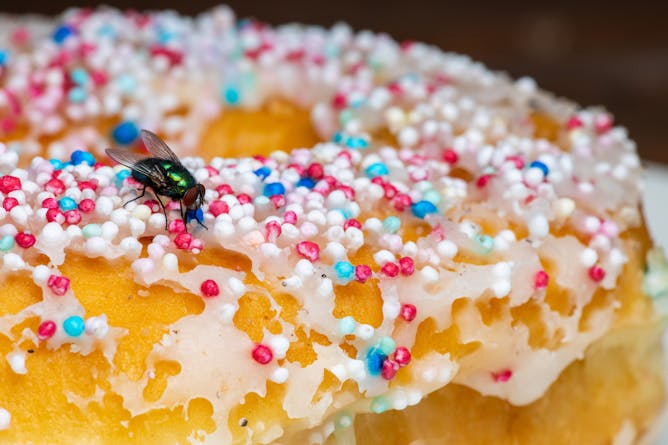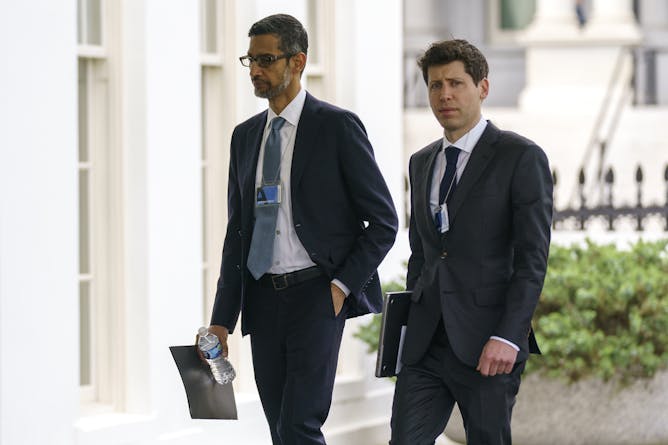|
|
|
|
Happy Sunday − and welcome to the best of The Conversation. Here are a few of our recently published stories:
A hallmark of a Conversation story is that it appeals to our readers' deep sense of curiosity about the world. Many of our most-read stories of all time fit this mold, such as why you shouldn’t kill spiders (5.7 million reads and counting) and whether the five-second food “rule” is fact or fiction (1.8 million).
That’s why our Curious Kids series, skillfully overseen by senior science and tech editor Maggie Villiger, has been such a hit with readers. Curious Kids invites children to ask questions about anything from whether space ever ends to why poop is brown, and we find genuine experts to answer them. This week, one of our top reader picks was one such Curious Kids article. Joey, a 10-year-old from Wausau, Wisconsin, wondered why flies seem to have a special radar for stinky garbage dumpsters. Christine Picard, a biologist who studies blow flies at Indiana University, answered Joey’s question while diving into many other things you probably wanted to know about flies but were too timid to ask.
If you have a question you’d like an expert to answer, send it to curiouskidsus@theconversation.com.
|

|
Bryan Keogh
Managing Editor
|
|
Readers' picks
|

The blow fly’s antenna is a specialized organ that helps the fly detect food quicker than its competitors.
heckepics/iStock via Getty Images
Christine Picard, Indiana University
Flies often beat out competitors for food because of their specialized sensing organs called antennae.
|
|
|
-
Arash Javanbakht, Wayne State University
Although emotions like fear and anxiety originate in your brain, they ultimately travel through your body and make your heart race and your stomach twist.
-
Evan Stewart, UMass Boston
Nonreligious voters are poised to make an impact, but sweeping statements about the ‘nones’ don’t tell the full story.
-
Thaddeus Hoffmeister, University of Dayton
Trump’s lawyers, and those prosecuting him, aren’t the only ones grappling with the problem of finding unbiased jurors in the age of social media.
-
Noah Kaufman, Columbia University; Chris Bataille, Columbia University; Gautam Jain, Columbia University; Sagatom Saha, Columbia University
Joe Biden’s ‘buy American’ effort with EVs likely violated World Trade Organization rules that the US helped create. The US has an opportunity now to update the system – if it’s willing to take it.
|
|
Editors' picks
|

Tech leaders like Alphabet CEO Sundar Picha and OpenAI CEO Sam Altman, seen here entering the White House, are just one piece of the AI regulation puzzle.
AP Photo/Evan Vucci
Dietram A. Scheufele, University of Wisconsin-Madison; Dominique Brossard, University of Wisconsin-Madison; Todd Newman, University of Wisconsin-Madison
Industry leaders, scientists and policymakers may see AI’s technical potential, but societies have trouble adapting to revolutionary advances without broad public participation.
|
|
|
-
Erica Neuman, University of Dayton
The agency hopes to make paying taxes less onerous for the majority of Americans who follow the rules.
-
William Gardner, University of Washington; Nicholas Kassebaum, University of Washington; Theresa A McHugh, University of Washington
Among young children, adolescents and adult women, anemia strikes 1 in 3 globally. Most cases are driven by dietary iron deficiency, red blood cell disorders and untreated tropical diseases.
-
Ling Zhao, University of Tennessee; Paul D. Terry, University of Tennessee
More people are seeking out traditional forms of medicine, from acupuncture to herbal medicines. The WHO is working to develop standards to make these healing practices implementable on a wide sale.
-
Judith Stepan-Norris, University of California, Irvine; Jasmine Kerrissey, UMass Amherst
Many of the reasons for strikes now – low compensation, technological change, job insecurity and safety concerns – mirror the motives that workers had for walking off the job in decades past.
|
|
|
|
|
Like this newsletter? You might be interested in our other weekly emails: About The Conversation: We're a nonprofit news organization dedicated to helping academic experts share ideas with the public. We can give away our articles thanks to the help of foundations, universities and readers like you. Donate now to support research-based journalism
|
| |
| |
| |
| |
|
|
|
|
|
|
|